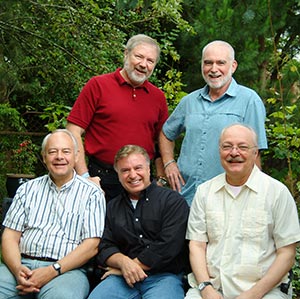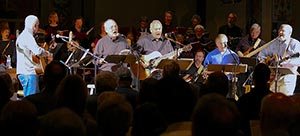One would be hard-pressed to find a church-going Catholic who can’t sing or hum a St Louis Jesuit (SLJ) song. If there were a Top 40 in Catholic music, it would, no doubt, include “Here I Am, Lord,” “Lift Up Your Hearts,” “One Bread, One Body,” and “Be Not Afraid.” The St. Louis Jesuits, back row, left to right, Fr. Roc O’Connor and Tim Manion, and front row, left to right, Fr. Bob Dufford, Dan Schutte, and Fr. John Foley, are pictured. (Submitted photo by Le Vu, courtesy Dan Schutte)
The St. Louis Jesuits, back row, left to right, Fr. Roc O’Connor and Tim Manion, and front row, left to right, Fr. Bob Dufford, Dan Schutte, and Fr. John Foley, are pictured. (Submitted photo by Le Vu, courtesy Dan Schutte)
Attendees presumably familiar with the names Schutte, O’Connor, Manion, Foley and Dufford will be able to see, hear and even sing along during the group’s first Milwaukee concert — a benefit for Cristo Rey Jesuit High School in West Milwaukee — Sunday, Sept. 20, 3 p.m., at Milwaukee’s Pabst Theater.
The SLJ include a Milwaukee parish priest (Jesuit Fr. Roc O’Connor); a Marquette University High School alumnus (Dan Schutte); and a member of the Society of Jesus who served for 14 years at the Jesuit Retreat House in Oshkosh (Jesuit Fr. Bob Dufford).
If you want to attendA limited number of tickets remain for the Sunday, Sept. 20 concert by the St. Louis Jesuits at 3 p.m. at the Pabst Theater, 144 E. Wells St., Milwaukee. For tickets, visit |
In a telephone conversation, Fr. Dufford, spiritual director for the clergy of the Diocese of Des Moines and pastor of two parishes in western Iowa, indicated a benefit staged by the SLJ, if something of a rarity in 2015, is not unique. He recalled similar SLJ appearances, typically for educational causes, in Seattle, New Orleans, Los Angeles, Washington and Chicago. Sunday will mark the group’s first performance in Milwaukee.
“Performance,” however, is not a descriptor SLJ members would use.
“Our main thing is that we were composers, not performers,” Fr. Dufford said. He mentioned that Schutte’s composition, “Here I Am, Lord,” and his own, “Be Not Afraid,” were used at respective religious services marking Tony Blair’s becoming prime minister of the United Kingdom and Bill Clinton’s inauguration as U.S. president.
Related article |
Additionally, “Be Not Afraid” was sung by actress Susan Sarandon in the movie “Dead Man Walking,” in which Sarandon’s real-life character, Congregation of St. Joseph Sr. Helen Prejean, ministers to a convicted murderer (Sean Penn) on death row.
 The St. Louis Jesuits, Tim Manion, left to right, Fr. John Foley, Fr. Bob Dufford, Dan Schutte and Fr. Roc O’Connor, are pictured in concert in Seattle in 2007. (Submitted photo courtesy Fr. Roc O’Connor)
The St. Louis Jesuits, Tim Manion, left to right, Fr. John Foley, Fr. Bob Dufford, Dan Schutte and Fr. Roc O’Connor, are pictured in concert in Seattle in 2007. (Submitted photo courtesy Fr. Roc O’Connor)
Schutte, who after leaving the Society of Jesus as a priest in 1986 served as director of music at Milwaukee’s Our Lady of Lourdes and Corpus Christi (now Blessed Savior) parishes and is now composer-in-residence at the University of San Francisco, said in an email to the Catholic Herald, “It’s really a misconception that during those early years (of the SLJ in the 1970s) we ‘performed’ as a group. We have never, either back then or now, thought of ourselves as performers. More correctly … we are a companionship of composers who began our collaboration while we were students at St. Louis University. We didn’t even think of ourselves as a ‘group’ till much later, because in those early years the only kind of performance we did was playing and singing for liturgies on campus.”
According to Fr. O’Connor, the men who 40 years ago recorded the million-selling album “Earthen Vessels” began composing at various times: Jesuit Fr. John Foley in 1963 with “You Are My God,” Fr. Dufford in 1968, Schutte also in the late ’60s, Tim Manion by 1973, himself in 1974.
Fr. O’Connor, in his second tour on the pastoral staff at Gesu Church since ordination in 1979, noted that SLJ concertgoers “have told us that the concert is more like a retreat. It’s not about being spectators, unless a person so chooses. And I believe nostalgia has only a tiny place, for me, in concert. I long for these songs to touch my heart (and the hearts of the others who will be on stage) and all who attend … in the context of what life is like today, not just yesterday.”
He also noted that for him, “The best thing for me about these concerts is playing and singing with these guys. We have had a way of knowing each other in a very special way when we sing, and sing with others.”
Schutte recalled “when we appeared (early on) as a ‘group,’ we crafted our presentation as a prayer experience with music and Scripture and story.” The young Jesuit singers “understood our music to be for worship, not for entertainment.”
Aside from Grammy considerations in 1976, 1977, 1978 and 1980, and the use of SLJ songs in the political and cinematic settings, Schutte remembered an overflow crowd at a Scranton, Pennsylvania, church where he and the other Jesuits provided music at a Mass during the original convention of the National Association of Pastoral Musicians.
Fr. O’Connor mentioned that same pastoral musicians organization’s bestowing its Jubilate Deo Award on the SLJ, and Seattle and St. Louis universities honoring them as distinguished alumni.
“The problem is,” he joked, “we have no clubhouse to hang such things.”
Fr. Dufford spoke of the satisfaction of “doing the recordings together,” despite the difficulties of the recording process, and of “getting something out and knowing that it’s doing good work.” He also recalled his month-long visit to Australia with Fr. O’Connor in the early ’80s, during which they conducted workshops and “huge prayer services” in Brisbane, Melbourne and Sydney.
Schutte, though, could likely have been commenting for all three interviewees – as well as for fellow group members Manion, who discontinued his studies as a Jesuit seminarian years ago, and Fr. Foley – when he wrote about being proudest “of how we were able through our music to bring sacred Scripture into the hearts and minds of Catholics. Many people have come to know Scripture because of music written and based on those words. Our impetus to write music based on Scripture rose directly out of our grounding in Ignatian spirituality. For Ignatius, the words of Scripture are a way of coming to know, love and serve the God of our hearts.”
Because the men live in different cities around the country, Schutte said he is looking forward to reuniting for the concert.
“Our energies are taken up by many different works. We have few opportunities to do music together. In addition, we are all getting older and experiencing the diminishment of the years. There’s never a guarantee of how many more times we might be able to sing together, so we treasure events like the one in Milwaukee,” he said.
Did you know?
Some intriguing tidbits emerged from the recent interview process involving members of the St. Louis Jesuits and the Catholic Herald.
- If any one St. Louis Jesuit is particularly suited to that name, it is Fr. John Foley. Not only is he, born in 1939, the elder statesman, he is also the only group member stationed in St. Louis – as artist-in-residence at the Catholic Studies Center of St. Louis University. The youngest member, Seattle-based Tim Manion, who discontinued his studies as a Jesuit seminarian years ago, now composes folk music in addition to performing.
- Fr. Robert O’Connor’s nickname – Roc – is comprised of the capital letters in his first and last names. The priest recalled it was 1975 when the SLJ “gathered in Cincinnati to record in a studio that had a 16-track machine, a wonderful facility, and a Nashville musician (John Pell) who composed the instrumental parts. We recorded 37 basic tracks and chose the best 12 songs” – resulting in “Earthen Vessels,” an album that shares its title with the Foley hymn among its selections.
- “I wanted to be a drummer growing up,” in Omaha, Nebraska, Fr. O’Connor lightheartedly noted. “Didn’t go over too well, being the oldest of eight (including six sisters) and living in a small house. So I learned guitar in the novitiate and play it like a drum a fair amount.” He added, “Composing is still on the back burner since I’ve become a videographer and editor of the videos I’ve posted” – and, Fr. O’Connor might have said, since recently taking over duties as Gesu’s pastor to assist ailing Jesuit Fr. John Schlegel.
- Born in Chicago, Fr. Bob Dufford grew up in Omaha. His father, Jack, sang and played harmonica and piano throughout the Midwest with the Four Kernels quartet. While Jack Dufford’s interest in music passed to his son, it excluded Jack’s interest in the piano. Young Bob started piano lessons but the future composer of “Like a Shepherd” and “Sing to the Mountains” quit after six weeks. Recently, Fr. Dufford said, “I’ve been doing a lot of instrumental pieces that are used in conjunction with the Spiritual Exercises (of St. Ignatius),” complete with a Bible-based “script … that could be used as a seed for contemplation.”
- Dan Schutte was reared in suburban Milwaukee and attended elementary school at St. Mary’s Visitation, Elm Grove. In the 1980s, he worked as liturgy director at Marquette University. “My primary work these days entails composing music, authoring books on spirituality and giving concerts and workshops,” Schutte said.
— Compiled by Tom Jozwik
